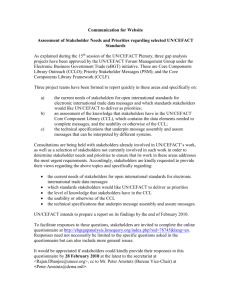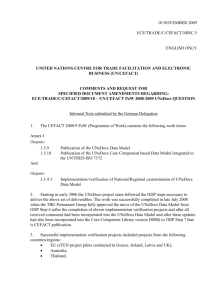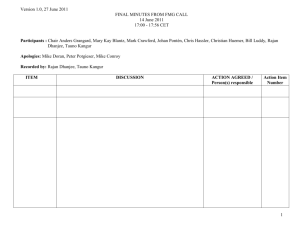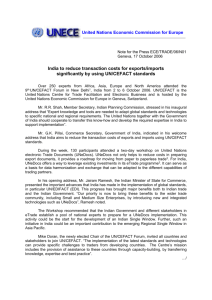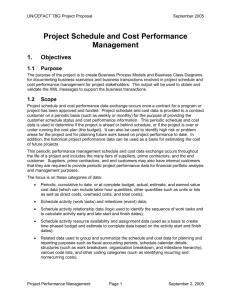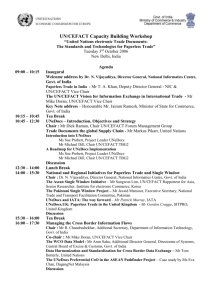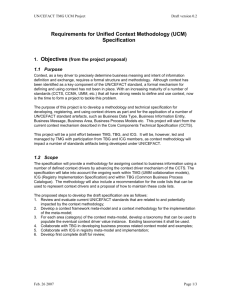Core_Components_Harmonisation--TBG17_20040310
advertisement
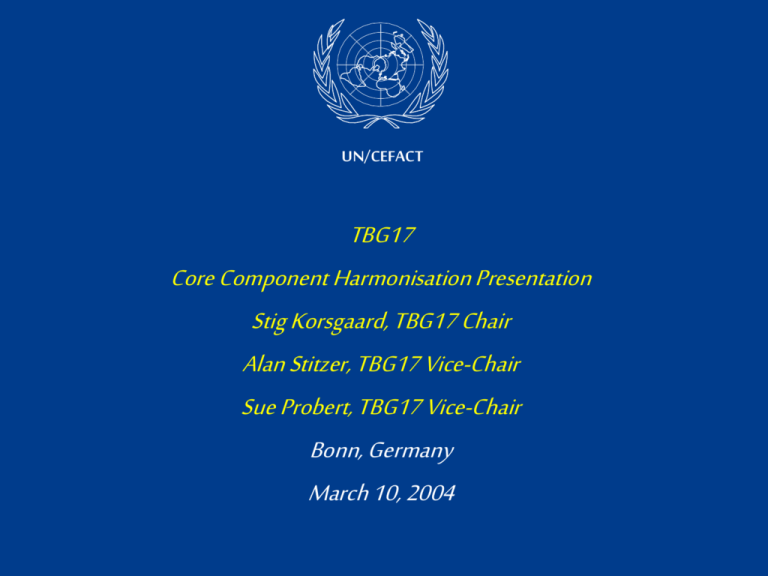
UN/CEFACT TBG17 Core Component Harmonisation Presentation Stig Korsgaard, TBG17 Chair Alan Stitzer, TBG17 Vice-Chair Sue Probert, TBG17 Vice-Chair Bonn, Germany March 10, 2004 Interim Meetings July 2003 – London Interim Meeting • • • • Extensive agenda focusing on delivering the first draft set of harmonised components Began review of and across nine submitted sets of candidates Submission Template reviewed Significant issues emerged relating to variations of CCTS implementation between submissions November 2003 – Pearl River Interim Meeting • • • • Approved ToRs and Procedures Completed review of and across nine submitted sets of candidates Submission Template reviewed and improved again Additional issues emerged relating to variations of CCTS implementation between submissions February 2004 – Amsterdam Interim Meeting • • • Submission Template reviewed and approved Additional issues emerged relating to variations of CCTS implementation between submissions Completed first 20 Core Components and prepared to submit to TBG Plenary for approval. UN/CEFACT UN/CEFACT Overview, cont’d TBG17 2004 Schedule • At least 4 meetings per year. Two plenary (March and September), two interim (this year 3 -- Amsterdam, Copenhagen, Palm Beach) • Teleconferences twice per month August 2004 – Copenhagen Sept 2004 – Washington, DC Forum Dec 2004 – Palm Beach UN/CEFACT TBG17 Procedures (Membership) Voting Members • TBG WGs & Other Forum Groups • Intl. Organisations • Others • Officers General Membership • Participants or Observers UN/CEFACT TBG17 Procedures (Decision Making) Consensus or Voting (1 per member) Quorum 80% of voting members and Two thirds must approve motion Voting members expected to represent their constituency UN/CEFACT TBG17 Procedures (External Liaisons) Organisations external to the Forum can participate and submit via the establishment of an officially recognised liaison to TBG17. Such organisations can be: • Intl Standards Organisations • Intl or regional User Groups • Governmental Organisations UN/CEFACT Current Submissions List a) TBG Internal • TBG1 Supply Chain (Steel Industry Procurement) • TBG3 Transport • TBG6 Construction (e-tendering) • TBG8 Insurance (ACORD, eEg7, CSIO) b) Joint UN/CEFACT & ISO • UNTDED including WCO and UNeDocs submissions c) External • EAN.UCC • OAGI • SWIFT • OASIS UBL UN/CEFACT Harmonisation Submission Procedures (1) The workbook template distributed by TBG17 is the required format for submissions: • This workbook generates the dictionary entry names based on the rules in the CCTS. • The workbook MUST be filled out completely, including definitions of used business terms. UN/CEFACT Harmonisation Submission Procedures (2) • Scope statements are very important to assist TBG17 in understanding the business context to which a submission was relates. • Additional background information such as class diagrams, data models etc. will be helpful to assist TBG17 in getting an overall picture of the business processes. UN/CEFACT Harmonisation Submission Requirements • TBG17 REQUIRES that at least one representative from a submitting organisation be present at a meeting which is processing their submissions. • The Controlled Vocabulary should be used in conjunction with the submissions to ensure a consistent meaning across submissions. – If a term exists in the controlled vocabulary, please use it! – If a term does not yet exist, please submit it for inclusion into the controlled vocabulary. • With each submission, changes or additions to the controlled vocabulary are accepted. UN/CEFACT Setting Expectations • Submissions will be reviewed as often as possible. As noted in previous slides, TBG17 meets at least 4 times per year. Twice at the forum, and another two times each year, once in the summer and once in the winter. • At all meetings, we must have attendence of a representative from each of the organisations whose submissions are scheduled for review • Harmonisation is likely to mean changes to submissions and a flexible culture will be essential to ensure success • Harmonisation is not an exact science. • There will ALWAYS have to be judgements and compromises. UN/CEFACT Deliverables • TBG17 approved Core Components Library • This includes BCC, ACC, etc. • Full audit of submissions back to submitter including feedback to illustrate ”what happened” • Summary of all actions taken during the meeting • Distributed to TBG17 mailing list. Each TBG group should have a representative on our team, this mechanism is a way to ensure your team gets brief feedback on what happened. • Controlled Vocabulary document • Submission and pre-harmonisation guidance UN/CEFACT Submission Example For Address ACC and BCCs 1. Look across all the submissions for common items – in this case Address. 2. We have submissions of Address from: • TBG6 • SWIFT • Eurofer • OAGIS • TC154 UN/CEFACT Submission Example Combine All Submissions (1) • • • • • • • • • • • • • • Identifier Format Code Addressee Text Building Number Building Name Street Name Unit Floor Post Box City Country Code Postal Code City SubEntity Country SubEntity • • • • • • • Delivery Point – Content Code – Delivery Point Name • Content • Enumerated Content Line One Line Two Post Code Unstructured Max_140 Address Type Code Mailing Indicator Yes No Indicator UN/CEFACT Submission Example Combine All Submissions (2) • • • • • • • • • • • • • • Registration Indicator Yes No Indicator Temporary Indicator Yes No Indictaor Block Max 35 Building Identification Max 35 Building Name Country Code Country Identification Max 35 District Name Max 35 Floor Max 16 Lot Max 35 Mail delivery Sub Location Max 35 Post Code identification Max 15 Post Office Box max 15 Region Identification Max 36 • • • • • • • • • • • • • • • • State Max 35 Street Name Max 35 Street Building Identification Max 35 Suite Identification Max 35 District Subdivision Identification Max 35 Location Building Name Street Name District Name District Sub Division Name City Name Postal Zone State Province Name Country ID Address Line Country ID UN/CEFACT ADDRESS ACC • • • • • • • • • • • • • • • BCCs Identifier Format City Name Post Code Additional Street Delivery Point Block Building Number Department Door •Floor •Inhouse Mail •Address Line 1 •Address Line 2 •Address Line 3 •Address Line 4 •Address Line 5 •Plot •Post Office Box •Street •Wing Associations Country Country Sub-Division Geo Coordinate Status Preference UN/CEFACT Next Step – Discussions 1. Each of the submissions are discussed in detail with the attendees 2. Definitions are checked against OED and Dictionary.com 3. Semantically similar concepts are combined 4. Dictionary entry names are adjusted to be more generic (if possible) 5. Definitions are clarified where needed UN/CEFACT Next Step – Mapping Each of the original submissions are mapped to the “new” entry in the Core Component library along with comments recording what happened. UN/CEFACT Next Step – Feedback to Submitters 1. A report is generated detailing what happened with the submission. 2. A summary of this report is emailed to the TBG17 mailing list highlighting changes and additions to the library and Controlled Vocabulary. UN/CEFACT Tentatively Approved ACC Core Components • • • • • • • • • • Account Address Country Country Sub-Division Geo Coordinate Organisation Location Person Communication Communication Number • • • • • • • • • • • Preference Period Contact Status Registration Relationship Event Tax Fee Dimension Range Calculation UN/CEFACT ACCOUNT Associations BCC’s • • • • • Identifier Status Name Currency Code Distinction Code • • • • Status Country Person Organisation UN/CEFACT Country BCC’s • Identifier • Name Associations • N/A UN/CEFACT Country Sub-Division BCC’s • Identifier • Name Associations • N/A UN/CEFACT Geo Coordinate • • • • • BCC’s Identifier Altitude Latitude Longitude Direction Associations • N/A UN/CEFACT Organisation BCC’s • • • • • • • • Identifier Name Legal Status Business Type Established Date Count Unit Name Code Associations • • • • • • • Account Location Organisation Contact Tax Fee Relationship Registration UN/CEFACT Location BCC’s • Identifier • Name • Numeric Associations • • • • • • • • Geo Coordinate Address Location Organisation Contact Tax Fee Relationship Registration UN/CEFACT Person • • • • • • • • • • • • • • • • • • Identifier Full Name Given Name Nickname Middle Name Family Name Previous Name Title Salutation Family Name Prefix Suffix Birth Date Death Date Marital Code Gender Code Age Characteristic Language BCC’s Associations • Location • Country UN/CEFACT Communication BCC’s • URI • Indicator • Instant Messenger Associations • Communication Number • Address • Preference UN/CEFACT Communication Number BCC’s • • • • • • • • Number Extension Country Dialing Code Area Dialing Code Dial Number Type Code Exchange Access Associations • Preference UN/CEFACT Preference BCC’s • Preferred Indicator • Priority Associations • Period UN/CEFACT Period BCC’s • • • • • Measure Indicator Text Start Date Time End Date Time Associations • Period UN/CEFACT Contact BCC’s • • • • Identifier Job Title Responsibility Department Associations • • • • Person Organisation Communication Preference UN/CEFACT Status BCC’s • Status Code • Status Reason • Date Time Associations • Period UN/CEFACT Registration BCC’s • • • • • • Code Date Time Text Measure Indicator Numeric Associations • • • • Status Period Country Country Sub-Division UN/CEFACT Relationship BCC’s • Code • Text Associations • Period UN/CEFACT Event • • • • • BCC’s Identifier Date Time Code Text Numeric • • • • • Associations Location Person Organisation Period Status UN/CEFACT Tax Fee • • • • • • • BCC’s Identifier Date Time Amount Code Text Numeric Quantity Associations • • • • • Location Country Country Sub-Division Period Status UN/CEFACT Dimension BCC’s • Measure Associations • N/A UN/CEFACT Range BCC’s • Measure Associations • N/A UN/CEFACT Calculation • • • • • • BCC’s Amount Quantity Numeric Text Code Date Time Associations • N/A UN/CEFACT Questions? UN/CEFACT SIMPLE, TRANSPARENT AND EFFECTIVE PROCESSES FOR GLOBAL BUSINESS. UN/CEFACT
